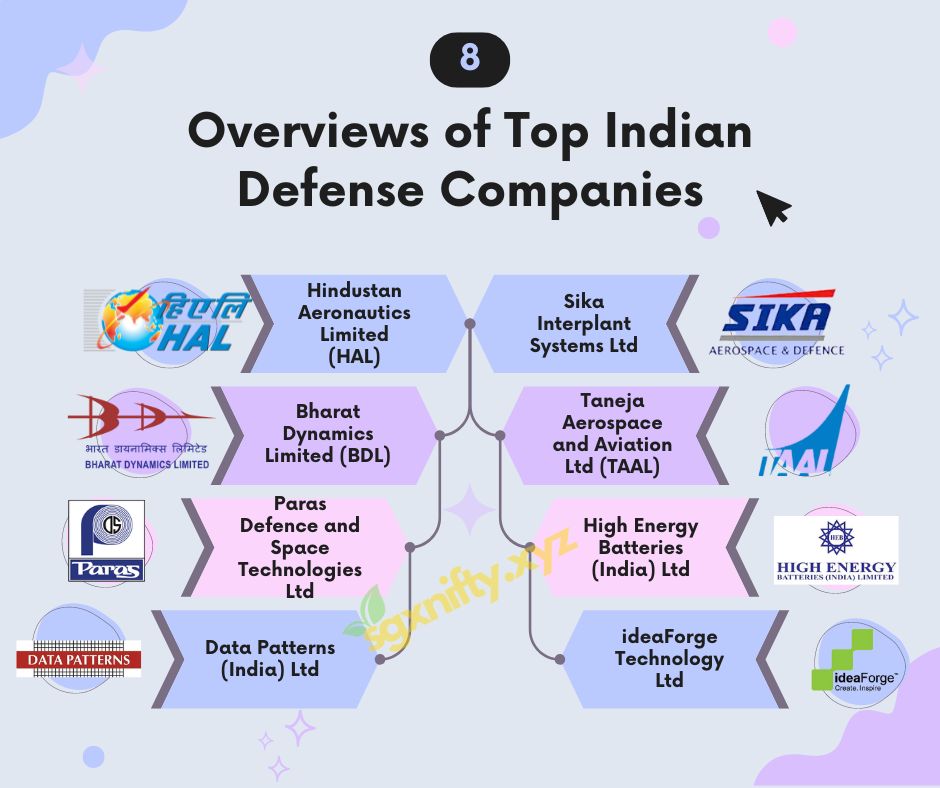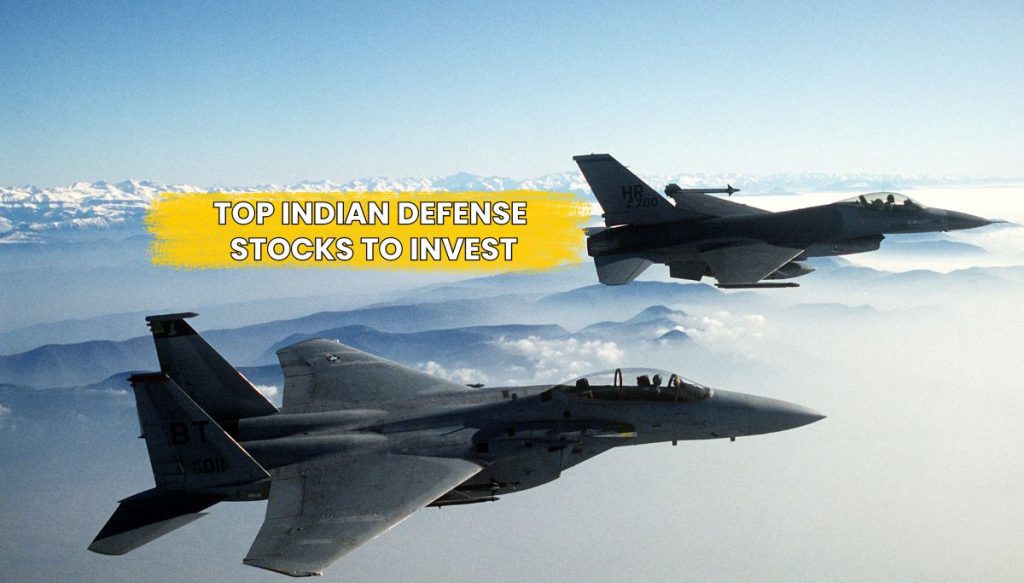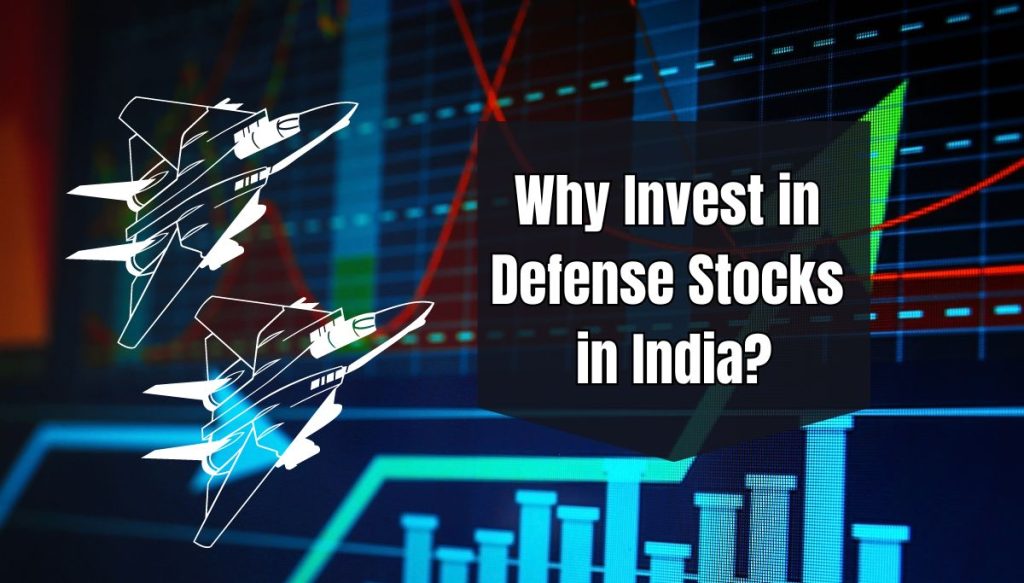
Remember the iconic “Make in India” campaign that swept across the nation? Its success has not only ignited a wave of domestic manufacturing but has also significantly boosted the Indian defense sector. This strategic initiative has propelled the country to become a major player in the global defense industry, attracting investments and fostering innovation.
In this blog post, we’ll delve into the top Indian defense stocks that are riding the wave of the “Make in India” momentum. These companies are poised to benefit from the increased government spending on defense, the growing demand for indigenously developed equipment, and the favorable policy environment.
Join us as we explore the most promising Defense stocks in India for 2024 and discover how you can capitalize on this thriving sector.
You May Like to Read: List of Tata Penny Stock
List of the Top Defence Stocks in India (2024)
| Stock Name | Market Cap (in Cr) | Share Price (Rs) | PE Ratio | 1Y Returns |
|---|---|---|---|---|
| Hindustan Aeronautics Ltd | 3,07,766.91 | 4,688.00 | 40.38 | 136.39 |
| Sika Interplant Systems Ltd | 1,128.95 | 2,614.90 | 58.01 | 130.91 |
| Bharat Dynamics Ltd | 47,603.64 | 1,303.85 | 77.69 | 121.45 |
| Taneja Aerospace and Aviation Ltd | 1,404.19 | 570.45 | 126.16 | 98.14 |
| Paras Defence and Space Technologies Ltd | 4,746.70 | 1,250.50 | 148.06 | 60.00 |
| High Energy Batteries (India) Ltd | 636.43 | 701.45 | 37.09 | 40.35 |
| Data Patterns (India) Ltd | 15,547.59 | 2,751.50 | 85.57 | 14.12 |
| ideaForge Technology Ltd | 3,034.12 | 711.15 | 67.01 | -28.14 |
The stock market is dynamic and prices fluctuate constantly. The data provided below is based on information available as of September 12, 2024 and may have changed since then. It’s crucial to use real-time data for accurate analysis. Please consult with a financial advisor before making any investment decisions.
Brief Overviews of Top Indian Defense Companies

Hindustan Aeronautics Limited (HAL): As one of India’s premier aerospace and defense companies, HAL has been a cornerstone of the nation’s defense capabilities for decades. With a strong track record of manufacturing aircraft, helicopters, and other defense equipment, HAL has consistently outperformed the industry average in terms of revenue growth and market share.
Sika Interplant Systems Ltd: A technology-focused company, Sika Interplant Systems Ltd offers a diverse range of engineering, manufacturing, and integration services to the aerospace and defense sector. Despite its smaller size, the company has demonstrated impressive growth in recent years, surpassing industry benchmarks in terms of revenue and market share expansion.
Bharat Dynamics Limited (BDL): A key player in India’s defense industry, BDL is renowned for its expertise in manufacturing ammunition and missile systems. With a strong focus on research and development, BDL has contributed significantly to the nation’s defense capabilities.
Taneja Aerospace and Aviation Ltd (TAAL): TAAL is a specialized company that manufactures aerostructure components and provides airfield infrastructure solutions. Its impressive growth rate and strong financial performance have positioned it as a promising player in the Indian defense industry.
Paras Defence and Space Technologies Ltd: Paras Defence is a leading provider of innovative defense and space technology solutions. The company’s focus on advanced technologies has enabled it to achieve consistent growth and expand its market share.
High Energy Batteries (India) Ltd: A key supplier of advanced batteries for defense applications, High Energy Batteries has demonstrated a strong track record of growth and innovation. The company’s products are essential for various defense systems and have contributed to India’s military capabilities.
Data Patterns (India) Ltd: Data Patterns is a vertically integrated electronics solutions provider that caters to the defense and aerospace sectors. With a focus on manufacturing high-quality electronic boards and systems, Data Patterns has experienced rapid growth and has become a significant player in the industry.
ideaForge Technology Ltd: A leading manufacturer of unmanned aerial vehicles (UAVs), ideaForge Technology is at the forefront of India’s drone industry. Its UAVs are used for various security and surveillance applications, making a valuable contribution to the nation’s defense capabilities.
You May Like to Read: Adani Group Penny Stocks List
Factors to Consider Before Investing in Defense Stocks in India

Investing in defense stocks in India can be a lucrative proposition, given the country’s growing defense budget and focus on indigenization. However, it’s essential to consider several factors before making any investment decisions:
1. Government Policies:
- Defense Budget Allocation: The allocation of funds to the defense sector plays a crucial role in determining the overall health of the industry. A higher defense budget typically translates into increased demand for defense equipment and services.
- Indigenization Policies: The government’s emphasis on indigenization can create significant opportunities for domestic defense companies. However, it’s important to assess the extent to which these policies are implemented and their impact on the industry.
2. Geopolitical Factors:
- Regional Tensions: The geopolitical environment can significantly influence the demand for defense products and services. Escalating tensions or conflicts can lead to increased defense spending.
- Global Trends: Global trends, such as the rise of terrorism or the proliferation of weapons of mass destruction, can also impact the defense industry.
3. Company Fundamentals:
- Financial Performance: Analyze the company’s financial statements, including its revenue growth, profitability, and debt levels. Look for companies with strong financial fundamentals and a track record of consistent performance.
- Order Book: A robust order book, especially from the government, is a positive indicator of a defense company’s future prospects.
- Research and Development: The company’s investment in research and development is crucial for staying competitive and developing innovative products.
4. Industry Trends:
- Technological Advancements: Keep an eye on technological advancements in the defense industry. Companies that are able to adapt to new technologies and develop cutting-edge products are likely to outperform their peers.
- Global Competition: Assess the level of competition in the global defense market. Companies with a strong competitive advantage, such as proprietary technology or a strong global presence, are more likely to succeed.
5. Valuation:
- Price-to-Earnings (PE) Ratio: Compare the company’s PE ratio to industry averages and historical trends. A lower PE ratio might indicate that the stock is undervalued.
- Price-to-Book (PB) Ratio: The PB ratio measures the market value of a company’s assets relative to its book value. A lower PB ratio might suggest that the stock is undervalued.
6. Risk Tolerance:
- Volatility: Defense stocks can be subject to significant volatility, especially in response to geopolitical events or changes in government policies. Investors should carefully assess their risk tolerance before investing in this sector.
By considering these factors, you can make informed investment decisions in the Indian defense sector and potentially benefit from the growth and opportunities it presents.
You May Like to Read: All Candlestick Patterns Pdf
Why Invest in Defense Stocks in India?

Investing in defense stocks can offer several potential benefits:
1. Steady Growth:
- Government Spending: Defense is a sector that typically receives consistent government funding, ensuring steady demand for products and services.
- Long-Term Contracts: Defense companies often secure long-term contracts with governments, providing a stable revenue stream.
2. Reduced Cyclicality:
- Essential Industry: The defense industry is less susceptible to economic downturns compared to other sectors. Even during economic recessions, governments continue to invest in defense capabilities.
3. Technological Advancements:
- Innovation: Defense companies invest heavily in research and development to stay ahead of technological advancements. This can lead to innovative products and services that have broader applications beyond defense.
4. Export Opportunities:
- Global Market: Many defense companies have the potential to export their products and services to countries around the world. This can diversify revenue streams and mitigate risks associated with the domestic market.
5. Dividend Potential:
- Profitability: Many defense companies are profitable and generate significant cash flows. This can lead to attractive dividend yields for investors.
However, it’s important to note that investing in defense stocks also carries risks:
- Geopolitical Risks: The defense industry is subject to geopolitical factors, such as international conflicts and changes in government policies. These factors can impact stock prices.
- Regulatory Changes: Government regulations can affect the profitability of defense companies. Changes in procurement policies or export controls can impact the industry.
- Competition: The defense industry is competitive, and companies must constantly innovate to maintain their market share.
The Future of Defense Stocks and the Defense Industry in India
The Indian defense sector is on track for significant expansion in the coming years, driven by several key factors:
- Increased Defense Spending:
- Rising Threats: India confronts a range of security issues, such as border tensions, terrorism, and cyber threats. These challenges have led to a consistent rise in defense expenditure.
- Modernization Efforts: The Indian government is focused on upgrading its military with advanced equipment and technology, which will boost demand for defense products and services.
- Indigenization Push:
- Government Initiatives: The Indian government is actively promoting the development of domestic defense equipment and technologies. This focus on indigenization is set to benefit local defense manufacturers.
- Technology Transfer: Collaborations with international defense firms can facilitate the transfer of technology, enhancing the capabilities of Indian defense companies.
- Export Opportunities:
- Expanding Global Market: The global defense market is growing, providing Indian defense companies with opportunities to export their products and services.
- Competitive Edge: Indian defense firms can leverage their cost advantages and technological expertise to compete effectively on the international stage.
- Research and Development:
- Innovation Drive: Investment in research and development is critical for the defense sector’s growth. India is prioritizing the development of homegrown technologies and capabilities.
- Collaborative Efforts: Partnerships with academic institutions and research organizations are crucial for driving innovation and technological progress.
- Private Sector Participation:
- Increased Engagement: The Indian government is encouraging greater involvement from the private sector in defense. This approach aims to introduce new ideas, investments, and operational efficiencies.
Challenges and Opportunities:
Despite the promising outlook for the Indian defense sector, several challenges need to be addressed:
- Regulatory Environment: A supportive and clear regulatory framework is essential for the sector’s development.
- Talent Acquisition: Attracting and retaining skilled professionals is vital for advancing defense technologies.
- Global Competition: The global defense market is intensely competitive, and Indian companies must remain agile and innovative to succeed.
Conclusion
The Indian defense sector is poised for significant growth, driven by increased government spending, indigenization efforts, and global market opportunities. Investing in defense stocks can offer a combination of steady growth, reduced cyclicality, and technological advancements. However, it’s essential to consider factors such as geopolitical risks, regulatory changes, and company fundamentals before making any investment decisions.
By carefully analyzing the top Indian defense stocks and considering the broader industry trends, investors can potentially benefit from the growth and opportunities presented by this sector.
